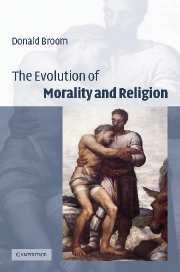Book contents
- Frontmatter
- Contents
- Preface
- Acknowledgements
- 1 Concepts and codes of living
- 2 Cooperation, altruism, reciprocal altruism
- 3 Biological capabilities needed for altruism and morality
- 4 Ideas about morality
- 5 The origins and value of religion
- 6 Other views about the origins of morality and religion
- 7 Social and political consequences of this biological view of morality and religion
- 8 Conclusions
- References
- Species list
- Author index
- Subject index
5 - The origins and value of religion
Published online by Cambridge University Press: 18 December 2009
- Frontmatter
- Contents
- Preface
- Acknowledgements
- 1 Concepts and codes of living
- 2 Cooperation, altruism, reciprocal altruism
- 3 Biological capabilities needed for altruism and morality
- 4 Ideas about morality
- 5 The origins and value of religion
- 6 Other views about the origins of morality and religion
- 7 Social and political consequences of this biological view of morality and religion
- 8 Conclusions
- References
- Species list
- Author index
- Subject index
Summary
THE MORAL CORE OF RELIGION
Religion of some kind is ubiquitous in human society. This is not surprising if man is an essentially religious animal as stated by Thorpe (1974), see Chapter 1, Section 1 and Chapter 5, Section 4. The definition presented in Chapter 1, Section 1 is: a religion is a system of beliefs and rules which individuals revere and respond to in their lives and which is seen as emanating directly or indirectly from some intangible power. The religion forms the basis for individuals' practices and attempts to know and conform with what is right. A great diversity of religions is included by this definition.
The proportion of people in the world who are actively involved in religious practices is difficult to assess but Bruce (1995) estimated that in 1990 it was 14% in the UK. A much larger proportion of people is substantially affected by fundamental aspects of one or more of the religions prevalent in their own society. Indeed, many who never attend religious services would acknowledge themselves to be part of a religion, and many who would not say this organise their lives according to a code of living which stems from a religion.
A central theme of this chapter is that religions have a common moral code which is central to their functioning. They also differ in more peripheral aspects which may be conspicuous and regarded by some as of central importance (Chapter 5, Section 2).
- Type
- Chapter
- Information
- The Evolution of Morality and Religion , pp. 164 - 193Publisher: Cambridge University PressPrint publication year: 2003



